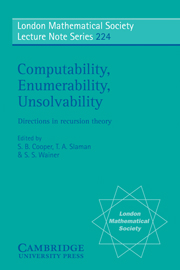Book contents
- Frontmatter
- Contents
- Preface
- Resource bounded genericity
- On isolating r.e. and isolated d-r.e. degrees
- A characterisation of the jumps of minimal degrees below 0′
- Array nonrecursive degrees and genericity
- Dynamic properties of computably enumerable sets
- Axioms for subrecursion theories
- On the ∀ ∃ - theory of the factor lattice by the major subset relation
- Degrees of generic sets
- Embeddings into the recursively enumerable degrees
- On a question of Brown and Simpson
- Relativization of structures arising from computability theory
- A Hierarchy of domains with totality, but without density
- Inductive inference of total functions
- The Medvedev lattice of degrees of difficulty
- Extension of embeddings on the recursively enumerable degrees modulo the cappable degrees
- APPENDIX: Questions in Recursion Theory
A characterisation of the jumps of minimal degrees below 0′
Published online by Cambridge University Press: 23 February 2010
- Frontmatter
- Contents
- Preface
- Resource bounded genericity
- On isolating r.e. and isolated d-r.e. degrees
- A characterisation of the jumps of minimal degrees below 0′
- Array nonrecursive degrees and genericity
- Dynamic properties of computably enumerable sets
- Axioms for subrecursion theories
- On the ∀ ∃ - theory of the factor lattice by the major subset relation
- Degrees of generic sets
- Embeddings into the recursively enumerable degrees
- On a question of Brown and Simpson
- Relativization of structures arising from computability theory
- A Hierarchy of domains with totality, but without density
- Inductive inference of total functions
- The Medvedev lattice of degrees of difficulty
- Extension of embeddings on the recursively enumerable degrees modulo the cappable degrees
- APPENDIX: Questions in Recursion Theory
Summary
In computability theory, Godel's incompleteness theorem [1934] finds expression in the definition of the jump operator. Thus, the Priedberg [1957] jump inversion theorem completely characterises the scope of the Godel undecidability phenomenon within the Kleene-Post [1954] degree structure for classifying unsolvable problems.
Minimal degrees of unsolvability naturally arise as the structural counterpart of decision problems whose solutions are extremely specialised (their solution does not have any other nontrivial applications). Spector [1956] showed that minimal degrees exist, while Sacks [1961] constructed one below 0′.
The first result concerning the jumps of minimal degrees was due to Yates [1970], who obtained a low minimal degree as a corollary to his construction of a minimal m below any given nonzero computably enumerable (or r.e.) degree. A global characterisation of such jumps was provided by the Cooper [1973] jump inversion theorem, while in the same paper it was shown that such a theorem could not hold locally (there are no high minimal degrees). The intuition that minimal degrees are in a sense close to 0 (the degree of the computable sets) was reinforced by Jockusch and Posner [1978], who found that all minimal degrees are in fact generalised low2 This, with Sasso's [1974] construction of a non-low minimal degree below ό, supported Jockusch's conjecture (see Yates [1974], p.235) that the jumps of minimal degrees below ό can be characterised as those ό-REA degrees which are low over 0′.
Information
- Type
- Chapter
- Information
- Computability, Enumerability, UnsolvabilityDirections in Recursion Theory, pp. 81 - 92Publisher: Cambridge University PressPrint publication year: 1996
Accessibility standard: Unknown
Why this information is here
This section outlines the accessibility features of this content - including support for screen readers, full keyboard navigation and high-contrast display options. This may not be relevant for you.Accessibility Information
- 1
- Cited by
